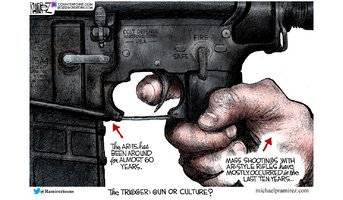SFC13557
NES Member
"The U.S. system is mired in sludge after decades of trying to solve problems like mass shootings."
ByDaniel Henninger from WSJ
June 1, 2022 6:30 pm ET
"A phenomenon of our times is that public events often get transformed—or reduced—into phrases, and the one that has followed the massacre in Uvalde, Texas, is “do something.” Here it means that because of the recurrence of mass shootings, something should be done to control the availability of guns in the United States.
A related phenomenon is the belief that “do something” will produce the desired result. But what if we have arrived at the point where something close to the opposite is true? Step back and it’s hard not to notice: The American political system has accreted so many solutions and sub-solutions to so many problems that what we have created is a system mired in sludge.
The political left is forever in the streets screaming the system “doesn’t work” for many people. Who could disagree? But they should take a closer look at what the “system” actually has become—whether the public schools, health care, criminal justice, mental health, climate or for that matter, the Pentagon.
It’s a morass of laws, follow-on laws, rules, administrative procedures, court decisions and revisions of revisions that have produced both unresponsive sludge and, increasingly, disasters. A sad political truth is that over time, do something often produces less of its intended good. The social cost of this nonperformance is significant: a spreading loss of faith in the governing system.
The big story in the news before Uvalde was the baby formula shortage, the result in large part of the risk-averseness of the Food and Drug Administration. People wondered why the FDA so overcompensated on risk. The explanation lies in a long-ago impulse to “do something.”
In the early 1960s a drug for morning sickness called thalidomide caused the birth of deformed babies, and laws were passed to tighten drug approvals. A mindset of hyper-precaution became embedded in the FDA’s culture. The agency quickly erected a drug-approval process of great complexity and cost, which often delayed the development of lifesaving treatments. The high approval cost—now estimated at $2.6 billion per drug—also means rarer diseases receive little research attention.
In 1969, under pressure to “do something” about air quality, Congress passed the National Environmental Policy Act. Today, there is little serious disagreement that NEPA—a case study in rule accumulation producing policy sludge—is eroding its own goals.
Two weeks ago in this space, after the Buffalo mass shooting, we described how the deinstitutionalization of the mentally ill in the 1970s, presumably for their own good, led to homelessness. The system proved incapable of producing the do-something goal of community-based care.
After George Floyd’s murder in Minneapolis, pressure built to do something about police accountability. Last week, President Biden issued an executive order with 19 accountability measures for federal police (his authority doesn’t extend to state and local levels). Over Memorial Day weekend in Chicago, 51 people were shot with nine killed. One reason gun violence has spiked in Chicago and elsewhere is that the police—under pressure from new rules or lawsuits—have retired or simply stepped back. The result is that neither police nor criminals are accountable.
House Democrats are moving to a vote on the Protecting Our Kids Act, combining eight separate gun-control acts. As a soundbite, it seems simple, obvious and straightforward. In practice, our too-complex system degrades just about every public responsibility into nonfeasance. Why would gun control be different?
Democrats and the media are raging at Republicans for refusing to “do something” about guns. I watched Majority Leader Chuck Schumer on the Senate floor last week and was struck by the intensity of his animosity toward the “MAGA” political opposition. A top official like Sen. Schumer is supposed to be a source of stability, but he’s not even trying anymore.
This recurring descent into political rage, on the left and right, has the makings of a systemic crisis—if we aren’t there already. As public confidence ebbs, the appeal of demagoguery spreads past the fringe.
This column won’t end with an appeal for a placating bipartisanship. That’s gone. Years back, a Democratic movement called “reinventing government,” an effort to streamline the bureaucracies, formed around then-Vice President Al Gore. But the big-government-forever Democrats—today led by Sens. Elizabeth Warren, Bernie Sanders and the Congressional Progressive Caucus—defeated that self-reform movement.
This refusal to brook any reform of public-sector performance created charter schools. It caused businesses like Tesla to leave California for Texas. It created Donald Trump.
What an irony that is. While the opposition after 2016 went mad over something called “Trump,” the Trump government’s Office of Management and Budget, under Mick Mulvaney, methodically undertook a reduction and rationalization of many federal rules. My larger point here is that something like that—basically a flushing out of the system’s sludge before more of the fed-up public heads into the streets—is the only real answer.
On taking office, Joe Biden reversed many of the reforms by what he calls “the previous president.” So we’re back to “do something.” That guarantees just one thing: more frustration."
Write [email protected]

